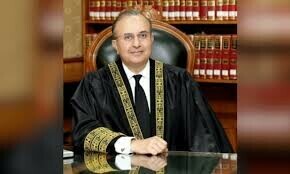OVER the past few months, some segments of the liberal and left factions in Pakistan have noticeably remained silent or indifferent towards the treatment of the PTI by the establishment. Historically, civil society, predominantly from the liberal and left circles, has been the torchbearer of democratic rights and civil liberties in Pakistan. A significant surge in civil society activism was evident during Musharraf’s era, most notably during the lawyers’ movement. Some contend that the surge was driven by the expansion of the middle class, possibly influenced by foreign inflows from events like the Afghan war, rather than by economic growth in sectors such as manufacturing.
This silence from the previously outspoken liberal-left has been puzzling to many. PTI’s leadership often derided them, catering to its right-wing base. Some within the liberal and left segments fault civil society for the quietness of their international ‘partners’, believing these partners follow the lead of their local counterparts. Some also point to the mild statements from the HRCP as an example.
In Pakistan, liberals represent a tiny fraction of the population, with the term ‘liberal’ even carrying negative connotations for many. This contrasts with India, where intellectuals like Amartya Sen and scholars from institutions like JNU proudly identify as liberals. While these Indian liberals actively resist the challenges posed by Modi’s regime, their Pakistani counterparts have long championed democratic rights and civil liberties. Yet, their recent inactivity will likely become a point of contention when documenting this era’s political history.
Questions also arise regarding the commitment of Western liberal democracies to freedom and democracy. Linking the silence of these nations to their respective ‘partners’ in Pakistan might be an oversimplification. Their commitment wavers, as seen in events like the democratically elected Muslim Brotherhood’s removal in Egypt in 2013, or the hindered victory of the Islamic Salvation Front in Algeria in 1991. Unlike previous incidents, the PTI’s ousting came through a vote of no-confidence process. However, there are concerns regarding coalition partners departing from the PTI-led coalition.
Pakistan’s liberal-left civil society has much to reflect on.
Some interpret these recent developments as the unravelling of the establishment’s decade-long hybrid project. On the contrary, the recent legislations have effectively given legal protection to the hybrid model, which civil society strongly opposed. Others contend that the PTI lacks a democratic ethos and draw some parallels with a Trump-like following. They argue that, while undermining democracy is condemnable, it’s not worth staunchly supporting a group that doesn’t adhere to fundamental democratic principles.
The Western countries’ reticence in condemning the PTI’s treatment might stem from broader geopolitical considerations. For instance, following the US troop withdrawal from Afghanistan, the US’s displeasure with Pakistan was palpable, especially with Imran Khan’s perceived pro-Taliban stance. This sentiment might illuminate the West’s inconsistency on democratic principles, as observed in Egypt and Algeria.
By this logic, Western support seems contingent upon whether the party or group in question upholds or opposes radical religious beliefs. This might also hint at the Pakistani liberal-left’s apathy. The underlying rationale that radical groups contradict democratic values and thus don’t deserve support needs more in-depth examination.
In this landscape, Pakistan’s liberal-left civil society has much to reflect on. A deeper exploration of what liberalism means in the Pakistani context is crucial, particularly as debates on democratic freedoms are rampant, but discussions on economic liberal policies remain conspicuously absent. Concepts like the charter of economy, which many see as aligning with IMF programmes, could potentially provide some clarity on liberal economic policies. The discussion on economic policies will sharply delineate the differences between the liberals and the left. Defining liberalism is intricate globally. Its discourse primarily emerged from an intellectual tradition rather than a political movement. In Pakistan, liberalism is often misinterpreted, and there is a dearth of representative liberal models to foster discourse. Possibly, the editorial policy of this newspaper over recent years can serve as a case study to elucidate liberalism in the Pakistani context.
The writer teaches economics at SOAS, University of London, and is associated with Bloomsbury Pakistan.
nadir.cheema@economics.oxon.org
Twitter: @NadirCheema
Published in Dawn, September 2nd, 2023















































Dear visitor, the comments section is undergoing an overhaul and will return soon.